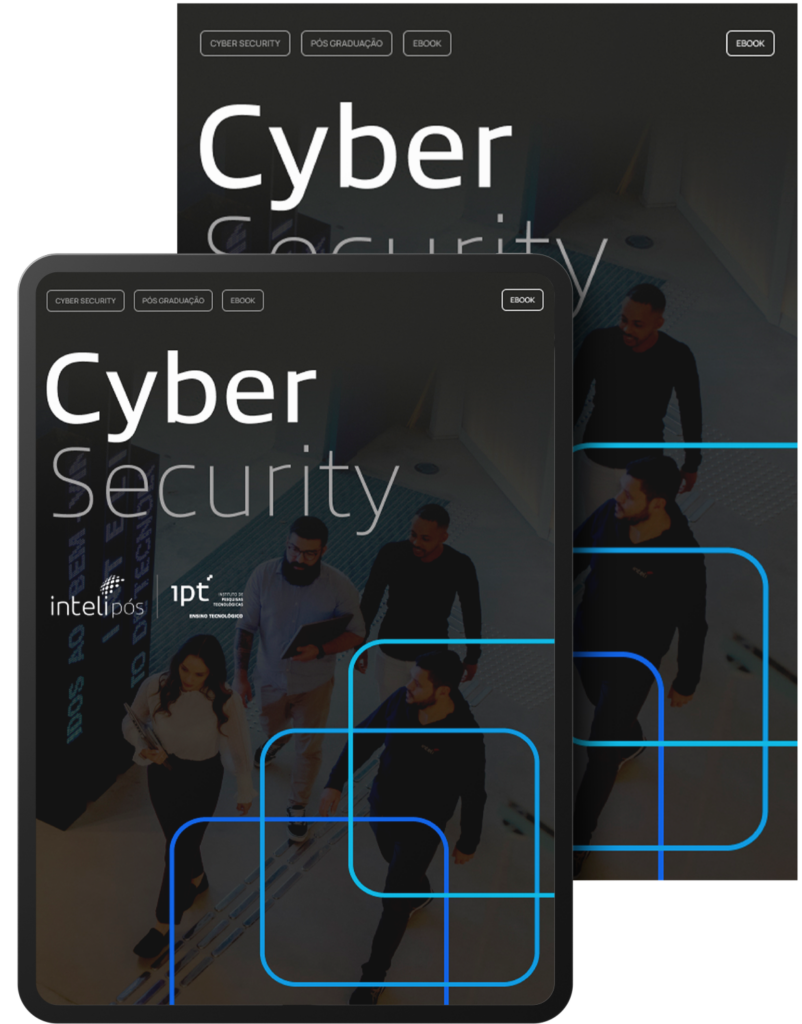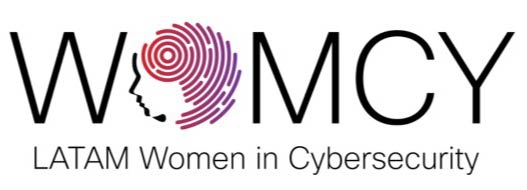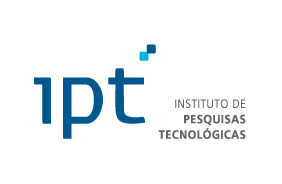
One in ten organizations worldwide suffered attempted ransomware attacks in 2023, an increase of 33% on the previous year*.
With the digital revolution, organizations need to adopt robust cybersecurity practices as a strategic component. In other words, technological innovation must go hand in hand with security to mitigate risks in the digital environment.
In an unprecedented partnership, Inteli and the Institute for Technological Research (IPT) are launching a postgraduate course in Cyber Security, with the mission of training specialists with a broad vision of cybersecurity, including topics such as quantum computing, strategic management and disaster response.

What you need to know...
Course duration
Type of course
Workload
Next class:
A partnership between two renowned institutions that breathe excellence and innovation in technology.
Brazil is expected to have a deficit of 140,000 cybersecurity professionals by 2025.*
Develop essential skills linked to the main market trends.
Renowned professors from Inteli and IPT, with experience and relevance in the market.
Get access to the latest cybersecurity tools for complete training.
*https://www.datacenterdynamics.com/br/not%C3%ADcias/cresce-demanda-por-profissionais-de-ciberseguranca-no-mercado-brasileiro/

Check out more information such as the curriculum matrix, full investment and other details in the course e-book!
On completion of the course, you will be able to:
Each module develops specific knowledge that is fundamental to facing relevant challenges in the area of cybersecurity.
A Inteli's innovative methodology ensures that you work on practical cases and develop technological artifacts with direct market applicability.
Live remote meetings, with face-to-face immersions on the Inteli and IPT campuses every 5 weeks, with hands-on activities.
Opportunity to customize the experience with an international journey with an Inteli and IPT partner.
Direct connection with industry partners and cybersecurity experts.
Fill in the form and send a professional CV and cover letter.
An online interview to understand your current career situation.
Sending documentation for enrollment.
4 independent modules, with no prerequisites:
In this module, you will have the opportunity to develop a project focused on computer network security, embedded devices and IoT, studying concepts such as hardware hacking, social engineering impact assessment and network simulation and security;
Technology
Network simulation and security
Hardware Hacking and IoT
Management & Leadership
Management and Protection against Social Engineering
Human
and Social Aspects of Cybersecurity
In this module, you will have the opportunity to develop activities around planning and executing security tests, applying concepts such as Pentest and Zero Trust Security, as well as planning and managing cybersecurity risk, focusing on cloud environments;
Technology
Zero Trust Security
Pentest planning and execution
Cloud-based Systems Architecture
Management & Leadership
Security Risk Assessment
Cybersecurity Risk Management
This module focuses on the process of managing and protecting large companies against security threats, developing a defense strategy and action plans for responding to incidents, as well as working on issues such as Compliance and Auditing of large companies in Cybersecurity;
Technology
Malware Analysis
NLP and Gen AI for Cybersecurity
Incident Management and Disaster Response Plan
Management & Leadership
Defense Strategy
Cybersecurity Compliance and Auditing
In this module, you will learn more about quantum computing and how it can impact the security of large organizations. The student will study risk analysis in cryptography, as well as cybersecurity governance and strategy, working on concepts such as implementing cryptography cracking and DevSecOps.
Technology
Breaking encryption using classical and quantum computers
Risk analysis with an impact on asymmetric cryptography
Management & Leadership
Leadership and Management of Cybersecurity Teams
Cybersecurity Governance and Strategy
+ Customizable Module 5:

Reginaldo Arakaki
PhD in Computer Engineering and Digital Systems, USP. PhD in Computer Engineering and Digital Systems, EPUSP.

Victor Hayashi
Information Security, Internet of Things,
Software Engineering and Conversational Systems.
7 years of experience. Master's degree in Computer Engineering
(Poli-USP).
Domingo Montanaro
Co-founder and chairman of Ventura ERM. An IT expert with 23 years' experience, he is a professor, international speaker and co-author of 5 books on data protection, incident response and cyber risk.

Andréa Tomé
Specialist in cybersecurity, GRC and internal auditing, with over 30 years' experience. A director and mentor in the field, she was voted Top 20 Women to Follow and awarded by Women in Tech LATAM. She teaches and speaks at international events.

André Borges
Chief Information Security Officer (CISO) at V.tal, specialist in cybersecurity and fraud prevention. With experience in Open Finance Brazil and in managing SOCs and CSIRTs, he lectures on DevSecOps, security automation and incident response.

Igor Teixeira
He holds a Master's degree in Computer Engineering from IPT and is a researcher at the São Paulo Institute for Technological Research. A specialist in Linux and cybersecurity, he works as a tech lead in the development of Lenovo's LUX operating system and teaches postgraduate courses.

Matheus Jacon
He holds a Master's degree in Computer Engineering from IPT and is a researcher at the Institute for Technological Research. With experience in RFID, IoT and cybersecurity, he works on the development of Linux and Android systems, as well as teaching topics such as reverse engineering and malware analysis.

Rodrigo Santos
D. in Computer Engineering from the University of Coimbra, former CISO of Eletrobras and specialist in cybersecurity for critical infrastructures. He has international certifications and extensive experience in risk management, privacy and information security.

Romeu Bulla
He has a Master's degree in Science from Poli-USP and has worked for more than 20 years in innovation, information security and artificial intelligence, with experience in startups and large companies. He is currently conducting research at LARC (Poli-USP) in partnership with industry.

Ana Cristina dos Santos
Professor, Academic Manager and Corporate Education with 28 years of teaching and management experience. PhD in Biomedical Engineering (POLI-USP).

Reginaldo Arakaki
PhD in Computer Engineering and Digital Systems, USP. PhD in Computer Engineering and Digital Systems, EPUSP.

Victor Hayashi
Information Security, Internet of Things,
Software Engineering and Conversational Systems.
7 years of experience. Master's degree in Computer Engineering
(Poli-USP).
Rodrigo Gava
CTO of VULTUS Cybersecurity Ecosystem, a specialist in data protection and incident response with over 10 years' experience in Offensive Security. He works on developing strategies for large institutions, focusing on investigation, root cause resolution and post-incident recovery.

Eduardo Takeo Ueda
Professor and Master's advisor at IPT and lecturer at SENAC-SP, specialist in Cryptography and Information Security. PhD in Electrical Engineering (USP), focusing on cryptographic algorithms and cybersecurity.

Rodolfo Goya
Computing. 44 years of experience in all areas related to computing.

Ana Cristina dos Santos
Professor, Academic Manager and Corporate Education with 28 years of teaching and management experience. PhD in Biomedical Engineering (POLI-USP).

Reginaldo Arakaki
PhD in Computer Engineering and Digital Systems, USP. PhD in Computer Engineering and Digital Systems, EPUSP.

Victor Hayashi
Information Security, Internet of Things,
Software Engineering and Conversational Systems.
7 years of experience. Master's degree in Computer Engineering
(Poli-USP).
Rodrigo Gava
CTO of VULTUS Cybersecurity Ecosystem, a specialist in data protection and incident response with over 10 years' experience in Offensive Security. He works on developing strategies for large institutions, focusing on investigation, root cause resolution and post-incident recovery.

Eduardo Takeo Ueda
Professor and Master's advisor at IPT and lecturer at SENAC-SP, specialist in Cryptography and Information Security. PhD in Electrical Engineering (USP), focusing on cryptographic algorithms and cybersecurity.

Rodolfo Goya
Computing. 44 years of experience in all areas related to computing.

André Godoi
Internet of Things and Embedded Systems. 19 years of teaching and market experience. PhD in Electrical and Computer Engineering (Mackenzie).

Reginaldo Arakaki
PhD in Computer Engineering and Digital Systems, USP. PhD in Computer Engineering and Digital Systems, EPUSP.

Victor Hayashi
Information Security, Internet of Things,
Software Engineering and Conversational Systems.
7 years of experience. Master's degree in Computer Engineering
(Poli-USP).
Rodrigo Gava
CTO of VULTUS Cybersecurity Ecosystem, a specialist in data protection and incident response with over 10 years' experience in Offensive Security. He works on developing strategies for large institutions, focusing on investigation, root cause resolution and post-incident recovery.
Alexandre Brum
COO and partner of VULTUS Cybersecurity Ecosystem. Former management consultant at FALCONI, specialized in operations at INSPER and Cybersecurity. Member of the PCI SSC - Security Standards Council.
Domingo Montanaro
Co-founder and chairman of Ventura ERM. An IT expert with 23 years' experience, he is a professor, international speaker and co-author of 5 books on data protection, incident response and cyber risk.

Guilherme Neves
Partner at Doutornet Tecnologia and Director of Cybersecurity at the International Society of Automation. He holds a PhD in Defense Engineering and has over 38 years' experience in IT, specializing in cybersecurity and computer forensics.

Anderson Aparecido Alves da Silva
Anderson, PhD in Electrical Engineering (USP) and Senior Researcher at IPT, has 23 years' experience in IT. He works on smart cities and information security projects, with a focus on IoT and machine learning.

Douglas Bellomo Cavalcante
He has a Master's degree in Automation and Process Control (IFSP), specialization in Industrial Automation (SENAI) and experience in CNC machine support. He is currently Technical Manager and Assistant Researcher in the area of Software Engineering and Intelligent Transportation at IPT.
Course Coordinator:
Victor Machado da Silva
Engineer from the Military Engineering Institute (IME) and Master in Systems and Computer Engineering from COPPE/UFRJ.
With an MBA in Project Management from FGV, he is currently Coordinator of Postgraduate Courses at Inteli, where he develops innovative educational solutions in technology and digital security. As a Software Engineer, he works in Software Quality and Technical Debt, crucial areas for guaranteeing the robustness and protection of technological platforms.
Course Coordinator:
Eduardo Luiz Machado
PhD in Economic Theory from USP and Dean of Postgraduate Studies at the Institute for Technological Research (IPT), with a focus on Digital Transformation and Industry 4.0.
His research includes Regulation and New Institutional Economics, key areas for understanding the economic impact of cybersecurity and new technologies in the industrial and digital environment.
Develop crucial skills for a cybersecurity expert and learn about technologies in practice, applying your learning to industry-demanded artifacts. Improve leadership, communication and strategic defense management skills, with a differentiated methodology, state-of-the-art infrastructure and engaged teachers with high professional and academic experience. Do you want to be part of this team of changemakers?
The main prerequisite is a completed degree. If the candidate does not yet have a degree, they must provide a certificate of completion showing the recognition of the course and the date of graduation, which must be before the start date of the postgraduate course. If you have an undergraduate degree certificate, you must provide the diploma within 60 (sixty) days of the start of classes, and your registration will be canceled if you do not provide it.
In addition to the academic prerequisite, it is desirable that the candidate has previous professional and/or academic experience with subjects such as Python programming, operating systems, computer networks and cloud computing. However, Inteli will provide complementary content to the course, so that the candidate can study content from these areas in parallel to the classes.
Classes will begin on February 3, 2025, with each module consisting of 10 weeks. The first module is scheduled to end on 14/04/2025, and the following modules will have their calendars presented after the start of classes, always at least one module in advance, so as to enable the student to plan their personal and professional life.
During the course, students will have classes both remotely and in person. The remote meetings will take place synchronously on Mondays and Wednesdays in the evening. The face-to-face meetings will take place every 5 or 6 weeks, always on Friday afternoons and Saturday mornings.
The postgraduate course in Cyber Security will last 360 hours, spread over a total of 15 months. There will be five modules, each lasting ten weeks. Classes will start on 03/02/2025.
The postgraduate course in Cyber Security follows a hybrid model, with synchronous remote classes and face-to-face meetings every 5 weeks or so.
The remote classes will be held live, and will be recorded so that the student can consult the material later. Even though the classes are recorded, attendance on the day of the class is essential to guarantee the minimum attendance required to pass the course.
Face-to-face classes will take place on the Inteli campus or in IPT laboratories, both located in Cidade Universitária (São Paulo/SP). The classes will not be broadcast or recorded.
As Inteli's methodology is 100% project-based, all meetings, even theoretical ones, are geared towards the development of the project that will be developed during each module. The methodology is anchored by self-studies, which are individual activities carried out with theoretical and practical content curated by the course teaching team and are aimed at structuring the student's technical knowledge before the meetings.
In general, the face-to-face meetings are hands-on, with activities in laboratories and practical applications together with the supervising teachers. Some of the remote meetings are aimed at consolidating key theoretical content for the course.
Yes, students must attend at least 75% of classes (remote and face-to-face) to pass each module. The recording of remote classes is a resource for reviewing important content and covering any unplanned absences.
There is no application or registration fee for the postgraduate course in Cyber Security.
Location
An innovation and technology ecosystem located in São Paulo, within the university city.
Courses
Become a partner
Location
An innovation and technology ecosystem located in São Paulo, within the university city.